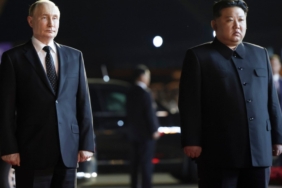Bu içerikte, Alman istihbarat şefi Bruno Kahl’ın Rusya’nın “hibrit” savaş önlemlerini kullandığı ve bu durumun NATO’nun 5. Madde’sini devreye sokma riskini artırdığına dair yorumlarını içermektedir. Hibrit savaş, konvansiyonel ve geleneksel olmayan yöntemlerin kullanımını içeren bir taktik olup, ülkelerde istikrarsızlık yaratmayı amaçlamaktadır. İçeriğin devamında, son zamanlarda yaşanan hibrit savaş olayları ve Rusya’nın bu taktikleri kullanıp kullanmadığına dair iddialar da yer almaktadır. NATO’nun 5. Madde’si ve bu maddeyi devreye sokma olasılıkları da tartışılmaktadır. Ayrıca, hibrit savaşın amacı ve buna karşı alınabilecek önlemler de ele alınmaktadır. Son olarak, AB’nin hibrid tehditlere karşı politikaları ve bağımsız Rusça medyayı destekleme gibi öneriler de içeriğin bir parçasını oluşturmaktadır.
[ad 1]
Kaynak: www.aljazeera.com
German intelligence chief Bruno Kahl said this week that Russia’s extensive use of “hybrid” warfare measures “increases the risk that NATO will eventually consider invoking its Article 5 mutual defence clause”, under which an attack against one NATO member is considered an attack against them all.
Hybrid warfare is the use of both conventional and unconventional means to create instability in countries without making it seem like an all-out war.
These kinds of tactics can include election interference, assassination plots and attacks on critical infrastructure, such as undersea cables, but they can be extremely difficult to prove.
So could these sorts of incidents really trigger retaliation against Russia by NATO countries?
What sort of hybrid warfare incidents have occurred recently?
Kahl’s comments on Wednesday came just days after two cables in the Baltic Sea were cut on November 17 and 18.
The Chinese-flagged bulk carrier Yi Peng 3 – which had departed from the Ust-Luga port in Russia and was reported by some media, including The Wall Street Journal, and research units, including the International Institute for Strategic Studies (IISS), as having a Russian captain – appeared to pass over the cables about the same time each was severed.
The Swedish police said the Chinese ship was “of interest”, and the Danish navy immediately began shadowing it through the Kattegat strait between Denmark and Sweden.
Swedish authorities are investigating the damage, which they say may have been caused by an anchor being dragged along the floor of the sea.
Is Russia using hybrid war tactics?
Russia has long faced accusations from the West of carrying out a hybrid war.
“Russia is conducting an intensifying campaign of hybrid attacks across our allied territories, interfering directly in our democracies, sabotaging industry and committing violence,” NATO Secretary-General Mark Rutte said on November 4.
“We know the Russians have developed a lot of hybrid warfare under the sea to disrupt the European economy through cables, internet cables, pipelines. All of our economy under the sea is under threat,” Vice Admiral Didier Maleterre, deputy commander of NATO’s Allied Maritime Command said, according to a Guardian report in April.
What other incidents has Russia been accused of?
In April, the United Kingdom alleged that Russia was behind an arson attack on a Ukraine-linked business warehouse in east London.
In July, CNN reported that the United States and Germany had foiled a Russian plot to assassinate Armin Papperger, the head of a German company that supplies arms to Ukraine.
The Swedish Agency for Support for Faith Communities said in February that it was reducing support to a Russian Orthodox church built in Vasteras in central Sweden. This was after Swedish intelligence services warned that the church was being used for intelligence operations. The church is located near the Vasteras Airport, which is on standby for use in the event of a military or civil crisis.
The church is also close to water treatment and energy facilities. Defence experts have warned Sweden to take action over this church, but it is not known if Swedish authorities have done so.
“The church offers a potential foothold that can be used for information-gathering, both directed at Vasteras Airport and at industrial interests in the form of large companies involved in the energy sector,” Markus Goransson, a researcher focusing on Russia at the Swedish Defence University, told Politico in a report published this month.
“When Sweden’s defence forces undertake exercises on or near the airport, as was done in June, they do so under possible surveillance from the church,” Goransson said.
The Baltic is a particular hotspot for this sort of warfare because it is surrounded by eight NATO countries.
In September 2022, explosions occurred along two Nord Stream gas pipelines. These run from Russia to Germany and are owned by a consortium of energy companies, including Russian gas giant Gazprom. No one claimed responsibility for the explosions, but the West has pointed the finger at Moscow.
Russia has also co-opted conservative social media personalities in Western countries, especially the US, to spread disinformation and propaganda, according to the American think tank Atlantic Council.
What is the point of hybrid warfare?
The goal is to create division and unrest within other countries. “Whenever a country is focusing on domestic disputes and arguments, its foreign policy becomes much weaker,” Pekka Kallioniemi – a Finnish disinformation scholar who is the author of Vatnik Soup, a book on Russia’s “information wars” – told Politico in an interview.
The Atlantic Council’s analysis added that authorities in Moscow also tend to back populist, right-wing leaders in Europe who share Russia’s anti-NATO, anti-European Union agenda and will introduce dis- and misinformation favouring those leaders and groups.
What is NATO’s Article 5?
Article 5 of the NATO treaty commits each member to treat an attack on an alliance ally as an attack against every NATO country.
“The increasing ramp-up of the Russian military potential means a direct military confrontation with NATO becomes one possible option for the Kremlin,” Kahl said this week. He predicted that the Russian military could “become capable of attacking NATO by the end of the decade”.
Article 5 has only been invoked once since NATO was established in 1949 – shortly after the September 11, 2001, attacks in the US.
Could NATO countries invoke Article 5?
Keir Giles, a senior consulting fellow at the London-based Chatham House think tank, told Al Jazeera NATO allies are unlikely to invoke the article against Russia.
“That is the whole point of calling it ‘hybrid war’ instead of real war,” he said.
Giles added that this sort of hybrid warfare has been going on for decades. He said the hybrid war is ramping up now because Russia is secure in the belief that it will not trigger all-out war. The ramping-up of these sorts of tactics “would have been unlikely if Russia was deterred by any countermeasures even as prosaic and basic as sanctions”, he added
Furthermore, an analysis published on Tuesday by IISS said: “The West lacks a strategy and the ability to act quickly in response to Russian hybrid warfare.”
“As long as NATO and European member states disagree on how to respond more assertively to the Kremlin’s hybrid warfare, Europe will remain vulnerable,” it added.
The US-based Center for European Policy Analysis has made suggestions for an EU hybrid threats policy. These include enforcing punitive measures such as sanctions and supporting independent Russian-language media to counter disinformation.
According to Giles, while sanctions were imposed in response to Russia’s war on Ukraine, they “should have been placed earlier” in response to hybrid warfare tactics.
Last year, the EU announced it would provide grants worth more than 2.2 million euros ($2.32m) to the Free Media Hub EAST project, led by the Prague Civil Society Centre, which supports independent Russian and Belarusian news outlets.





Yorumlar kapalı.